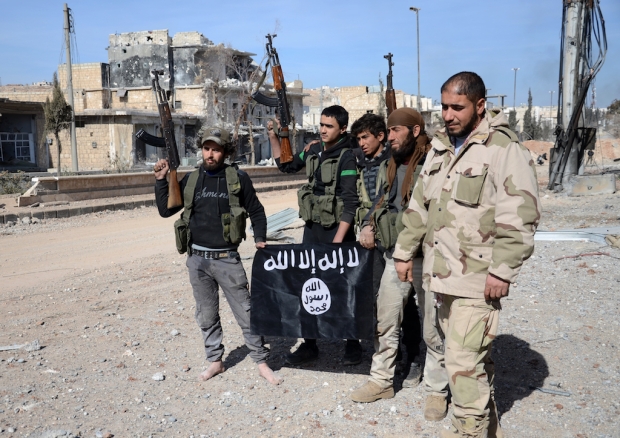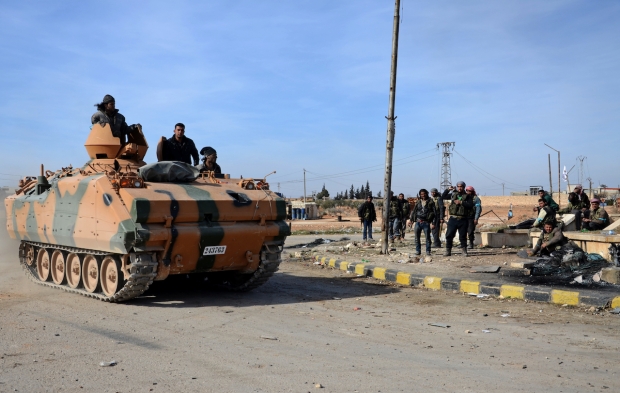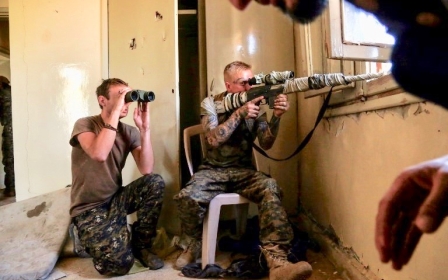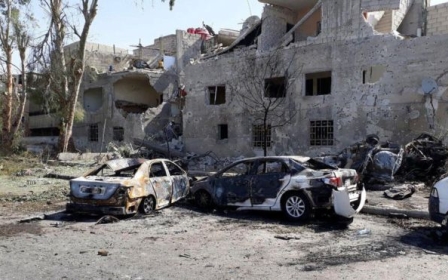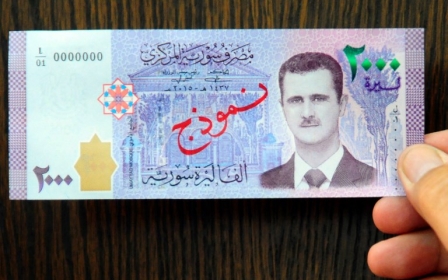Syria war: Turkey 'disbands rebel battalion' as alliances collapse
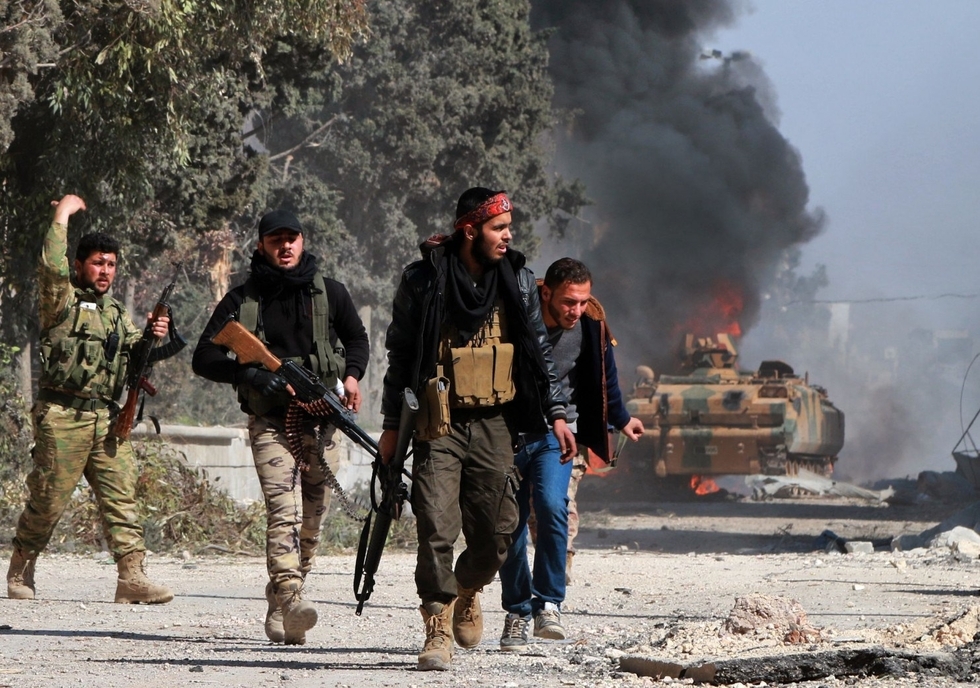
Splits have emerged between Turkey and nominally pro-Turkish fighters in northern Syria after the leader of one group said he was imprisoned by Turkey for three weeks following the proclaimed end of Operation Euphrates Shield.
Mahmud Khallo, the chief commander of the mostly Kurdish group, Liwa Ahfad Salahaddin, told Middle East Eye that after being imprisoned, Turkish forces disarmed his whole battalion, which was originally formed by Syrian Kurds opposed to the People's Protection Units (YPG) and the Islamic State group.
"Even though we oppose the YPG and the Kurdistan Workers Party (PKK), Turkey took our weapons after Euphrates Shield formally ended. Now that we are unarmed, we are going to set up a political party," he said.
Although he had previously been a prisoner of the YPG for 19 months, his arrest by Turkey on the first day of Ramadan soured his views of the country.
"Turkey has used all the brigades to gain influence in the region," he said.
Turkey invaded Syria in August 2016, primarily with the aim of eliminating the Islamic State group, backing a variety of Syrian Arab, Kurdish and Turkmen opposition groups.
A secondary aim, however, has been the elimination of the YPG, whom Turkey views as an offshoot of the Kurdistan Workers Party (PKK). Turkey has long feared that the expansion of the YPG's federation in northern Syria, currently made up of a series of partly connected "cantons", could provide a base of operations for the PKK to launch attacks on the country.
The Turkish government refused to comment on Khallo's claims, saying it does not comment on Euphrates Shield operations.
However, a source from within one of the FSA groups told MEE that a few such arrests had been made, without specifically mentioning the Liwa Ahfad Salahaddin group.
"I cannot comment on this specific incident but the (Turkish) army had to make some moves like this. There were some minor groups working against the general interest. Where there is smoke there is fire," the source said.
'Turkish mandate'
But even some anti-YPG locals in northern Syria have grown wary that the country is entrenching an area of control in the border region.
"We respect Turkey and love our Turkish brothers, but we will not accept to become a Turkish mandate," said Izzedin Salam, head of the Fastaqim Union's political office, another group previously involved in Euphrates Shield.
Salam said he was concerned about Turkey's links to Qatar, where Turkey recently deployed forces in the wake of a diplomatic crisis between the Gulf states.
We respect Turkey and love our Turkish brothers, but we will not accept to become a Turkish mandate
- Izzedin Salam, Fastaqim Union
He added that Turkey's "support for Turkmens results in conflicts among Syrians".
Politicians and military leaders in Turkey have frequently spoke of the need to protect the Turkmen, who are ethnically and cultural largely identical to Turks in Turkey, from both the Syrian government and regional Islamist and Kurdish forces, while many usually ultra-nationalist Turks have entered to Syria to fight alongside Turkmen groups.
Even though the Turkish prime minister, Binali Yildirim, declared the end of Operation Euphrates Shield in late March, a large number of Turkish soldiers and garrisons remain.
New offensive
Although there has been a recent lull in fighting, apart from occasional cross-border fire and air strikes, Turkish-backed forces are once again preparing to challenge the YPG.
"Fighting with the YPG has never ended," said Nassir Husso, a journalist attached to the Syrian Turkmen Brigades.
"About 25 villages around Tel Rifaat are Turkmen or Arab. We are going to recapture those areas.
"Currently, we are preparing for such an operation and for that purpose we are also cooperating with brigades that are located in Idlib," he added.
"They are ready to launch an offensive on Afrin."
The Afrin district has been controlled since 2012 by the YPG, which considers it a "canton" of their proclaimed autonomous Democratic Federation of Northern Syria, referred to as Rojava by Kurds.
In February 2016, the YPG extended its reach and captured nearby Tel Rifaat. However, even though Afrin is partly connected to the eastern YPG-held territory by a route that goes through areas controlled by Bashar al-Assad's forces, the YPG cantons remain separated.
While the PKK is recognised as a terrorist organisation by the US, EU and UK, the YPG have received US support as the dominant component of the Syrian Democratic Forces (SDF), which also contains Arab and Turkmen brigades fighting against IS.
Turkey-backed 'national army'
In late May, Turkey announced that it would be forming a new "national army" as a counterweight to the YPG, IS and the Syrian government.
"All the brigades in the area are organised in a joint operations room that works closely with the Turkish forces," Husso said.
"Turkey is trying to harmonise the various rebel groups by forming a new national army in northern Syria. Together with security forces that are trained by Turkey, the National Army will guarantee safety even after the war has ended.
"Our aim is to topple the regime, but for now, we have to focus on defending the Turkmen areas from terror organisations."
Ismail Khalawi Abu Hamza, Ahrar al-Sham's relations manager for the area, said Turkey's assistance in northern Syria was crucial to counter-balance other proxies in the region.
"While Russia and the US are supporting the SDF, we rely on cooperation and a true alliance with our neighbour Turkey," he said.
"Clashes with the SDF occur almost daily. But we fought both the PKK and IS back."
Tensions have continued to mount between Turkey and the US over the latter's support for the SDF and Turkey has been keen to build up its own alternate force in the region.
But while many locals in northern Syria have expressed fears of YPG hegemony, others are growing concerned that Turkey could be set to remain a major presence as well and that the PKK conflict could end up dominating northern Syrian politics.
- additional reporting by Ömer Özkizilcik
New MEE newsletter: Jerusalem Dispatch
Sign up to get the latest insights and analysis on Israel-Palestine, alongside Turkey Unpacked and other MEE newsletters
Middle East Eye delivers independent and unrivalled coverage and analysis of the Middle East, North Africa and beyond. To learn more about republishing this content and the associated fees, please fill out this form. More about MEE can be found here.


